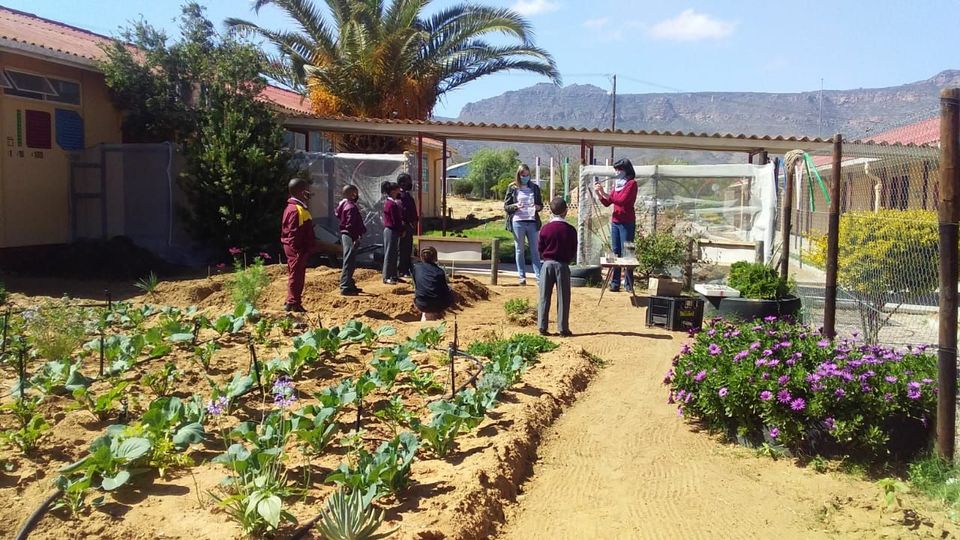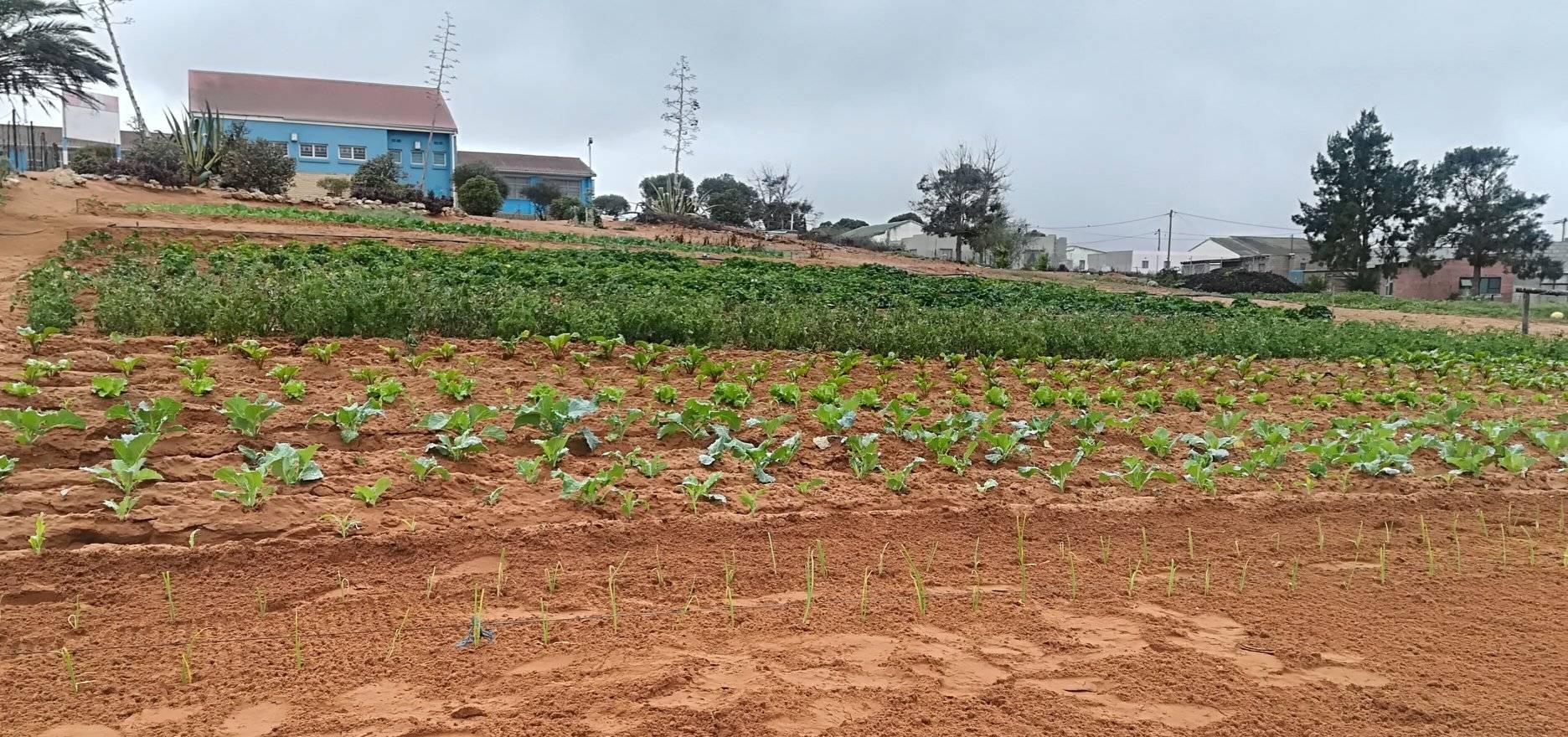Thanks to the Jala Peo Food and Nutrition Garden project, every participating primary school on the dry West Coast now boasts a well-maintained vegetable garden that promotes learners' agricultural learning and produces food for nutrition programmes at schools and communities.
This feat for the initial 19 primary schools is a culmination of four years of hard work and collaboration between various stakeholders, including Stellenbosch University (SU), says Ms Sunet Anderson, project coordinator of the Jala Peo School Food and Nutrition Garden at Jet Education Services, a Johannesburg organisation focussing on improving education for the disadvantaged South African population.
The collaboration between most of the stakeholders, including the University, is continuing this year. They share the vision of introducing vegetable gardens to disadvantaged schools to eradicate hunger and advance education. “Stakeholders are keen to help when it comes to eradicating hunger, especially under children, and promote education. Their contributions help to turn these goals into a reality," says Anderson.
In signing a memorandum of agreement with Jet at the end of last year, SU fulfils a significant role in creating a cost account and managing the project's funds. “The project is therefore self-sustainable and now managed locally instead of running on funding and management from a central agent," Anderson explains.
In continuing its collaboration this year, SU offers training in water-wise gardening and facilitates liaison with Power Ponics, a non-profit company responsible for installing aquaponics at some of the schools. The University also supplies curriculum-aligned teacher training material.
Food gardens in harsh and arid conditions
Partnering primary schools lie in the harsh, arid and underserved areas near Vredendal, Bitterfontein, Klawer, Doringbaai and Vanrijnsdorp – all in the Matzikama municipality district.
In 2018, 19 schools joined the project's pilot phase due to a dire need for infrastructure and educational development. Last year, six more schools were added.
In participating in the project, the schools had to overcome a variety of challenges that worked against their gardening plans. In finding solutions, they managed to mitigate the environmental and weather difficulties.

Finally, all the schools reached their goals of establishing well-maintained and producing gardens, which form part of the schools' daily management. “On top of that, they also integrated the garden project into learners' school curriculum, supplied fresh produce to school nutrition programmes and promoted the environment's greening," says Anderson.
In reflecting on this social impact initiative, Anderson emphasises that all the stakeholders learned valuable lessons and best practices regarding sustainable gardening in harsh environments. Most lessons involve mitigating water scarcity, harsh weather conditions, poor soil quality, low human capacity, gravel roads and vast distances.
“With the funding from a wide base of stakeholders, schools received infrastructure to better cope with harsh climate conditions on the West Coast, including shade net structures and rainwater tanks.
“The Department of Agriculture has played a significant role in building human capacity and skills through training gardeners, teachers and community members in soil preparation and vegetable production.
“The Department of Health contributed by presenting workshops on nutrition to learners, community members and food handlers in the National School Nutrition Programme, using the vegetables from school food gardens to prepare meals for learners," says Anderson.
In general, this project focuses on maintaining and further developing the school gardens on the West Coast, possibly expanding the project to other schools in the Western Cape, and exploring more funding opportunities and research possibilities, says Anderson. Recently Syngenta came on board as a major funder going forward.
SU is committed to staying involved in a project that has a broad societal impact. “I am very passionate about this project that has a huge impact on the community," says Mr Henk Stander from SU's Faculty of AgriSciences. Stander presented an aquaponics training workshop to some of the teachers at the schools.
Impact on schools and the community
One of the participating schools is Steilhoogte Primary near Vredendal. The school's fully functional vegetable garden produces vegetables for the school and the community. The garden project at the school has been so successful that they could expand to develop a nursery that produces seedlings for other school gardens.
Mr Manus Spamer, principal at Steilhoogte Primary, praises the project and its many opportunities. “It is fantastic to be enabled by all the knowledge sharing, training, funding and assistance to cultivate vegetables," says Spamer.
Spamer states that besides the learners' grasp of vegetable gardening, the garden also produces much-needed food. “We supply fresh produce to the school kitchen and use the garden waste to feed our pig farms or to create compost," says Spamer.
Steilhoogte Primary now operates as a community centre which promotes agricultural practices in the community, where gardening at residences is also encouraged.
This year, the school has started investigating possibilities to expand the agricultural activities to include packaging, cooling and transporting the fresh produce, says Spamer.
The other primary schools involved in the project are Vredendal North, Vredendal Secondary, Vergenoeg, Naastdrift, Spruitdrift, Booysendal, Steilhoogte, Kleinrivier, Nieuwoudt, Trawal, Maskam, Uitkyk, Koekenaap, Lutzville, Ebenhaeser, Doringbaai, Bitterfontein, Rietpoort and St Boniface.In 2021 the project scaled to include six more schools, namely Sederberg , Elizabethfontein, Graafwater Primary and Special School, Nuwerus and Nuwefontein. These schools are also making good progress in establishing and continuously improving gardens.

